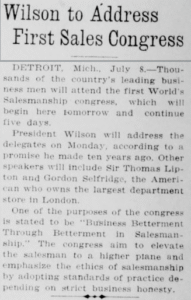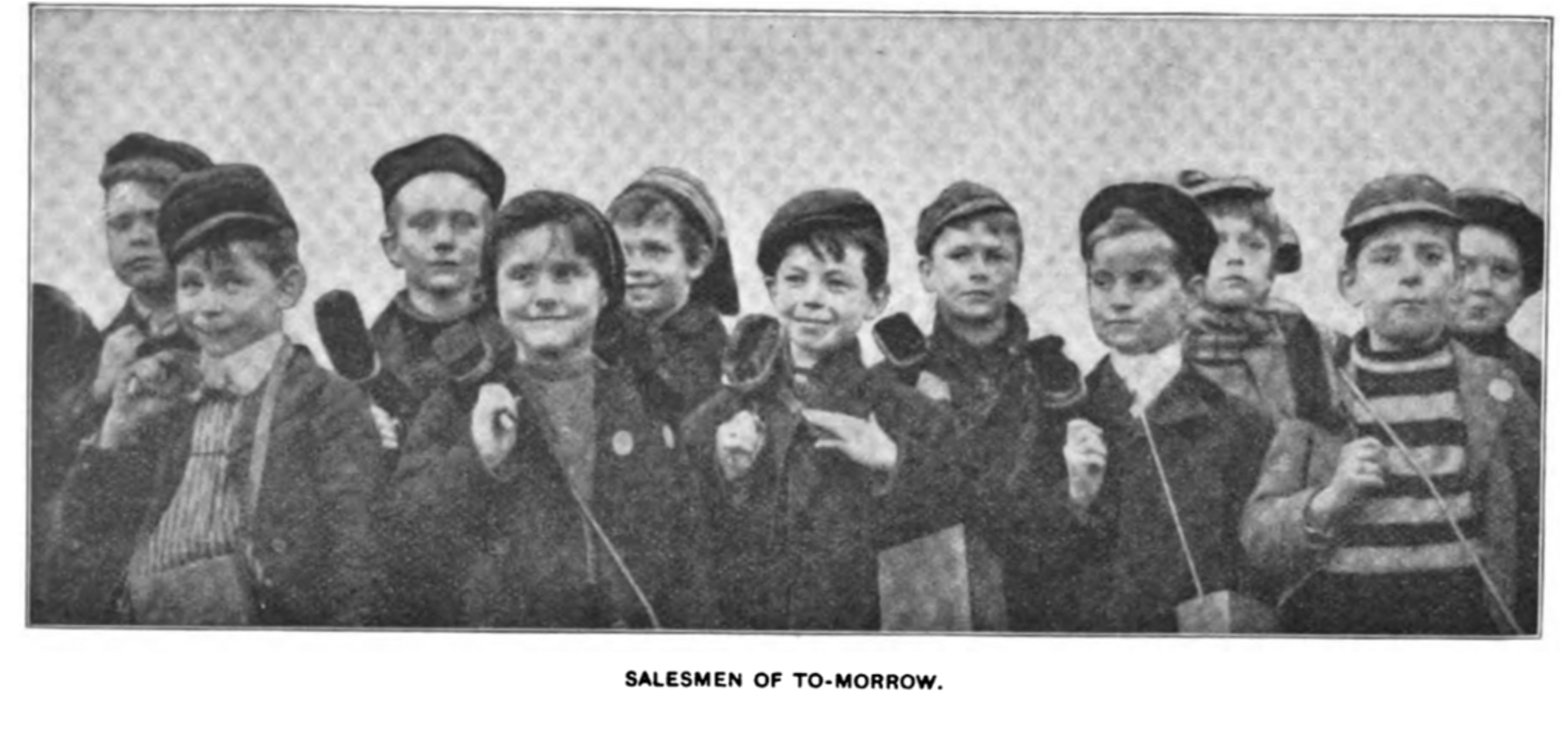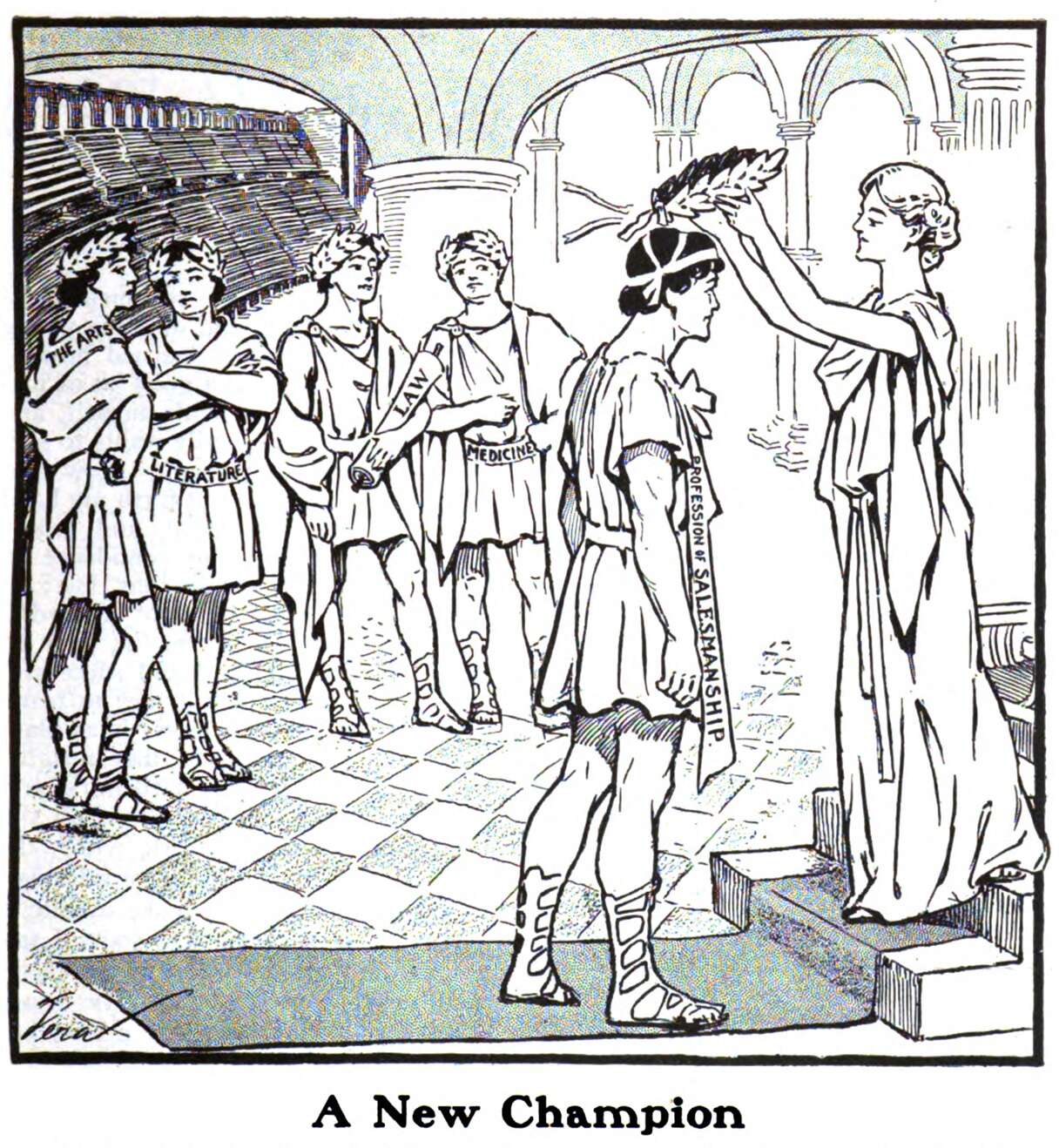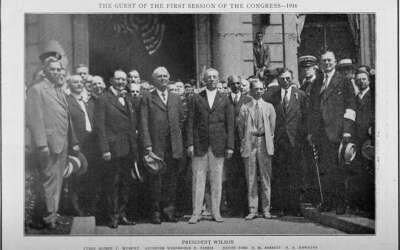The Low Prestige of the Sales Profession
Years back, when I first started dating my now wife, Christy, she was telling her sister Kara about me:
Kara: “What does he do?”
Christy: “He’s in sales.”
Kara: “Ugh. Gross!”
What is your perception of the sales profession?
Each year, Gallup publishes a study reflecting the perceptions of all the major categories of professions through their annual honesty and ethics study. Each year, salespeople scrape the bottom along with politicians. Is it a fair assessment?
As a sales professional, how would you position selling to change one’s negative perception?
I define the sales “profession” as starting in the late 1800s. Companies like the National Cash Register (NCR) Corporation and Burroughs Adding Machines hiring their own salespeople, versus the backslapping, hard-drinking independent rep “drummers” and “bagmen” era of before.

LA Herald, July 8th, 1916
The sales team was the company’s brand to the public, their customers, and their prospects. Salespeople in the early 20th century were trusted, respected, and admired. At the first World Sales Congress in July of 1916, then US President Woodrow Wilson was the keynote speaker. Sellers, selling the right products to the right companies and the right price at the right time were the vessel by which our economy and our country established ourselves as a world power. Sellers who view the world through the eyes of the buyers, helping them achieve their desired outcomes, resulting in a strongly growing economy, from which all within it benefit.
From 1905 through the 1920s (at least), “salesmanship” (as they called it) was taught at all the major colleges, and even in many high schools – taught to both men and women! The position was flourishing.
The positive perception was all gone by the 1960s. What happened?
There’s a gap of information and research-backed data on the true cause of the erosion of the profession. Sales was no longer taught in colleges or high schools. It was a demand problem.
In a 1965 study in the Journal of Marketing, college students were asked about their perceptions of the profession.
- The overwhelming majority did not and would not want to get into sales.
- Many of those same students had very uncomplimentary things to say about the occupation.
Colleges and high schools aren’t in the business of offering a curriculum if nobody wants it.
This perception was impacting the economy. The economy needed salespeople in both quantity and quality. And even those who were in the profession were seeking a way out because of the associated unsavory social standing. Individuals received less satisfaction from their work due to the unfavorable societal perception.
By 1981, this perception had only slightly improved. According to an article in the Fall of 1981 edition of the Journal of the Academy of Marketing Science, companies were forced to turn to college campuses as a core source of potential sales recruits. And it was no easy task. “Surveys of student attitudes toward the selling occupation portray a consistently negative evaluation of sales careers.” Students not only refused to take sales positions, but they resisted even interviewing for them.
The results were significant. Businesses not able to attract quality individuals for sales positions meant lost revenues – which trickled across the economy.
“At least since World War II and especially since the beginning of the buyers market in the mid-1950s, a great many executives have become increasingly perplexed about the dearth of interest in personal selling as an occupational goal.” – John L. Mason, The University of Toledo, 1965
What makes an occupation prestigious?
In the 1965 Journal of Marketing study, it was theorized that five elements contributed to occupational prestige. Out of the five, selling possessed three.
- White-collar versus Blue-collar Occupations: The distinction historically between the two was superficially between manual and mental activities. Perceived status was given to those occupations which were primarily nonmanual, and selling is considered white-collar work. Let’s score this one an “A”
- Income: Professions, where income is perceived as being consistently high, are considered to be prestigious – with one caveat. The sales profession falls squarely in the category of being on the upper end in terms of income, however, variable incomes are viewed as being less desirable and carry less prestige than stable incomes. We’ll score this one a “B”
- Freedom of Action: The highest professions in this category are generally observed in entrepreneurial or self-employed type roles. For the most part, the sales profession is not a self-employment role, however, it is met with a considerable amount of freedom in the conduct of their role – meaning, relative freedom from close supervision. In this category, the sales profession is likely a “B”, too, unless you’re entry-level and in an office every day.
- Education and Training: This category doesn’t favor the sales profession as you might think. This category of education and training refers to lengthy, formalized, and expensive required by law, practice, or custom. The role of a doctor or a lawyer implies a formal education requirement and experience. In sales, there is no formal credential, degree, or expensive and lengthy educational requirement to enter the profession. The sales profession ranks low here…likely a C or a D.
- Power: This category also does not favor the sales professional, in that prestige is assigned to individuals and roles who have oversight and control over the behavior of others. Salespeople may have the ability to influence buyers but typically have no subordinates. As a result, they are ranked low in this category. A C or a D score here, too.
Of the five categories determined to associate a profession with prestige, the sales profession scores highly on three of them. The demand for classes and education in professions that score worse is considerably higher and continues to be.
Why? Why would sales continue to be so repulsed as a career option?
Consistently, students are not attracted to a profession where they believe the sole focus is on persuading individuals to buy things. Couple that role focus with a reputation that, at their worst, salespeople don’t tell the truth, and at their best, don’t tell the whole truth – and it’s a recipe for low prestige. Especially if they have experienced being “sold to” before. Theodore Levitt, in his book Innovation in Marketing from 1962, referred to it as a “natural and irremovable difference of interests between sellers and buyers”, and that we are all buyers.
I believe the future of the profession is bright. I believe we must shed two words from our lexicon: “scale” and “convince”. We must return to the 1916 goal of the role, to help individuals achieve outcomes, whether it’s with you or with somebody else. Honestly. Transparently. Help buyers to predict, not to convince. Eliminate the word “scale” in reference to anything that is solely metrics-focused instead of buyer-focused.
I’m proud of my work as a sales professional, and my career in the field. Are you?

Picture from a 1904 edition of Salesmanship Magazine
With that, a question for you: How would you position the sales profession to someone who has a negative perception?

Shameless self-promotion:
- If your team is looking for help – especially around negotiations or revenue leadership, those two programs are intensely popular right now. Reach out, as the economy tightens, the need for a structure from which to present, propose and negotiate becomes so much more important. And, revenue leadership structure, process and the understanding of behavioral science to keep everyone intrinsically inspired are vital. Email to info@toddcaponi.com

- The Transparent Sales Leader is almost here! July 5th we’re releasing the Kindle version, with paperback just behind it. Audiobook and Hardcover later this summer. Preorder now, if you’re so inclined!
(header image “A New Champion” from Salesmanship Magazine, 1906)





0 Comments